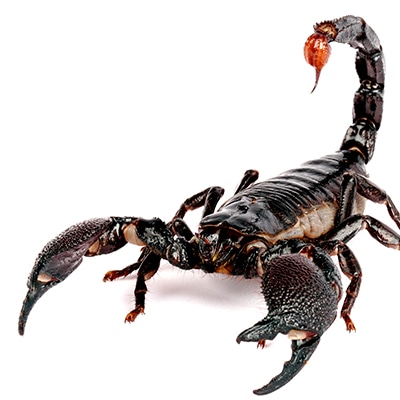Emperor Scorpions
Pandinus imperator

Price: $20.00
Emperor Scorpion (Pandinus imperator)
Overview
The Emperor Scorpion is one of the largest and most popular scorpion species in the pet trade. Known for its impressive size, striking appearance, and docile nature, the Emperor Scorpion is an excellent choice for both beginner and experienced arthropod enthusiasts. Native to West Africa, this scorpion thrives in a controlled environment where it can display its natural behaviors and characteristics.
Physical Characteristics
- Size: Emperor Scorpions are large, reaching lengths of 6-8 inches (15-20 cm) when fully grown, with some individuals growing even larger.
- Lifespan: They have a long lifespan, living up to 6-8 years in captivity, and sometimes even longer with proper care.
- Appearance: These scorpions have a robust and glossy black or dark brown exoskeleton, with large pincers and a long tail ending in a stinger. Their body is segmented, and they have long, jointed legs that allow them to move quickly when necessary. They also have a distinctive, large, and intimidating-looking stinger, though they are not typically aggressive.
Housing
- Enclosure: A 10-20 gallon tank is sufficient for a single Emperor Scorpion. They require a secure lid to prevent escape, as they can climb, though they are not known for being escape artists. It is essential to provide enough space for them to move around, burrow, and hide.
- Substrate: Use a deep, loose substrate, such as coconut coir, peat moss, or a mix of sand and soil. The substrate should be deep enough (at least 3-4 inches) to allow the scorpion to burrow, as burrowing is a natural behavior for them.
- Hides and Enrichment: Provide a variety of hiding spots such as cork bark, rocks, and other natural materials to mimic their natural environment. Since Emperor Scorpions are nocturnal and often spend their time hiding during the day, it’s important to give them plenty of spaces to retreat to.
Temperature and Humidity
- Temperature: Maintain a temperature range of 75-85°F (24-29°C) during the day. Emperor Scorpions are sensitive to temperature fluctuations, so it’s crucial to maintain consistent warmth. At night, the temperature can drop slightly, but it should not go below 70°F (21°C).
- Heating: Use an under-tank heater or a heat mat to achieve the desired temperature. Avoid direct heat lamps, as they can dry out the environment and disturb the humidity.
- Humidity: Emperor Scorpions require high humidity, typically between 60-80%. To maintain the right humidity level, mist the enclosure lightly once or twice a day. Keep a shallow water dish available at all times for hydration.
Lighting
- Lighting: Emperor Scorpions do not require UVB lighting. Since they are nocturnal, they are naturally adapted to living in low-light conditions. A regular day-night cycle (12 hours light, 12 hours dark) should be maintained to help them stay on their natural rhythm.
- Avoid Direct Light: These scorpions should not be exposed to direct sunlight, as this can raise temperatures too high and cause dehydration.
Feeding
- Diet: Emperor Scorpions are carnivorous and primarily feed on insects. They enjoy a variety of feeder insects, including crickets, roaches, mealworms, and waxworms. Larger scorpions may also accept small mice or lizards.
- Feeding Frequency: Juveniles require more frequent feeding, typically every 3-4 days, while adults can be fed once a week. Ensure that the insects are appropriately sized for the scorpion, and remove any uneaten prey to prevent mold or pests.
- Water: Always provide a shallow water dish with fresh water. Even though they are adapted to living in dry environments, scorpions need access to water for hydration.
Handling and Temperament
- Handling: Emperor Scorpions are generally known for their docile nature, especially compared to other scorpion species. However, they should still be handled with care and respect. When handling, support their entire body gently and avoid picking them up by the tail. It’s best to handle them infrequently and avoid stressing them out with prolonged interactions.
- Behavior: They are primarily nocturnal and are most active at night, foraging for food or exploring their environment. They tend to be slow-moving and prefer to stay hidden during the day in their burrows or under hiding spots. While they are not aggressive, they may sting if they feel threatened.
Health and Veterinary Care
- Common Issues: The most common health issues for Emperor Scorpions are dehydration or improper humidity, which can cause them to become sluggish or stressed. Ensure the enclosure is kept humid and that they always have access to fresh water. Also, avoid handling too frequently or roughly to prevent stress.
- Veterinary Care: While scorpions generally do not require regular veterinary visits, a reptile veterinarian can help with health issues such as molting problems, injuries, or parasitic infestations. Regular observation of their behavior and condition will help catch any issues early.
Conclusion
The Emperor Scorpion is a fascinating, relatively low-maintenance pet that can live for many years with the right care. Their impressive size, docile temperament, and unique behaviors make them an excellent choice for anyone interested in keeping arachnids. With proper housing, feeding, and handling, Emperor Scorpions will thrive in captivity and provide years of enjoyment to their keepers.
Category: Scorpions